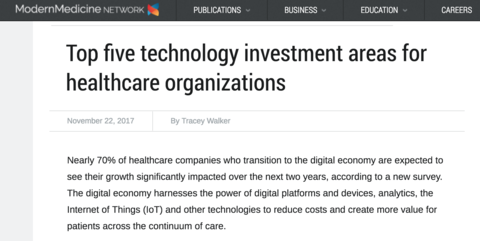Nearly 70% of healthcare companies who transition to the digital economy are expected to see their growth significantly impacted over the next two years, according to a new survey. The digital economy harnesses the power of digital platforms and devices, analytics, the Internet of Things (IoT) and other technologies to reduce costs and create more value for patients across the continuum of care.
"Digital Transformation in Healthcare: A Positive Prognosis," from SAP/Oxford Economics, was designed to track the progress of digital transformations of healthcare companies, including their abilities to better anticipate real-time demand and supply for services, streamline prevention and treatment, and give patients greater control over their own health. Nearly 400 healthcare executives were surveyed; 21% of respondents call the U.S. or Canada home. The balance of participants hailed from Latin America, Europe, the Middle East and Asia.
"Digital innovation will fuel the next wave of breakthroughs in healthcare and accelerate the broader shift toward data-driven care for healthcare organizations. Unlocking actionable data insights in real time is critical for the future success of value-based care," says Thomas Laur, global president, SAP Health.
While lacking substantial impact from digitization efforts so far, respondents expect significant impact over the next two years in the areas of customer satisfaction (61%) and innovation (59%), according to the survey. Digitization provides a path to redesign business models, remove organizational and data silos, automate processes and reduce repetitive tasks.
"The findings support the fact that healthcare organizations are planning to invest most heavily in big data and analytics (76%) and cloud technologies (65%) in the next two years.
[...]
Laur draws five conclusions from the survey results regarding where healthcare organizations are investing in technology most heavily:
- Technology that improves efficiency. With increased cost pressures, healthcare organizations are striving to standardize and streamline administrative processes for greater efficiencies and improved operations.
- Technology that supports decision making and personalized medicine. With aging demographics and the rise of chronic diseases, organizations are increasing investments in big data and analytics that can support simpler decision-making while providing data-driven insights for personalized clinical treatments and optimized patient outcomes.
- Technology that empowers patients. Digital empowered and connected patients have greater expectations for readily accessible and valuable healthcare insights. "The early prioritization to patient experience and digital engagement practices reflects the movement toward helping patients better navigate the healthcare system, empowering them to take active roles in monitoring and managing their health, and in the facilitation of open and immediate communication with the healthcare provider network--all with digital services," Laur says.
- Technology that protects against cyber threats and data breaches. The shift to a connected digital healthcare network elevates the need for improved security and privacy, and this is reflected in increased investments in security.
- Technology that improves remote health monitoring. The emergence of advanced medical devices, sensors and wearables provide patients and healthcare providers an opportunity to reap the potential benefits of extended monitoring, greater disease prevention, and improved fact-based care decisions. Healthcare organizations are continuing their investments in mobile and IoT to support these emerging opportunities.
Source: Modern Medicine (View full article)
Posted by Dan Corcoran on November 22, 2017 08:33 AM



Post a comment